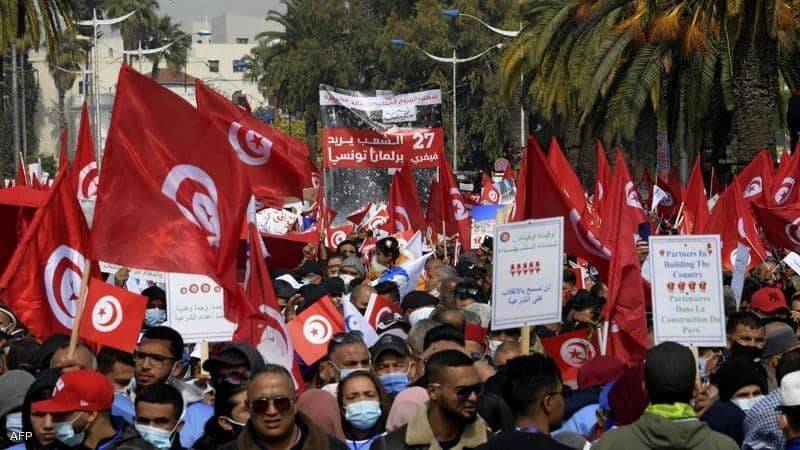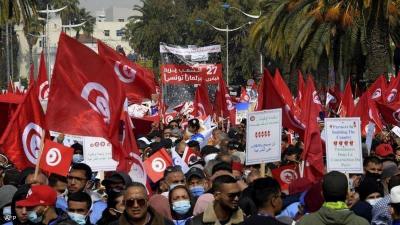Under the title "The Crisis in Tunisia: How Did the Country Reach This Stage?", the BBC website published a report noting that in 2011, the spark of the Arab Spring revolutions initiated in Tunisia and soon spread to other countries where protests demanding democracy and justice erupted, leading to the downfall of the regimes of Tunisian President Zine El Abidine Ben Ali and Hosni Mubarak in Egypt within a few months. However, ten years later, Tunisia, once considered the only success story of the Arab Spring, is now in a state of turmoil and chaos. Tensions escalated in the country on July 25, when President Kais Saied dismissed Prime Minister Hicham Mechichi and suspended the parliament's work, a move deemed by the president's opponents, particularly the Islamists, as a "serious coup." Under the constitutional powers he claims to possess, Saied has implemented a series of measures to impose order in the country following a wave of mass protests. Ricardo Fabbian, an expert on North Africa at the International Crisis Group, states that these measures have led to "the worst political crisis in Tunisia since the 2011 revolution." He adds, "No one knows where the situation is heading, and the president's steps seem like a leap into the unknown." The country is experiencing an unprecedented crisis fueled by political instability, social unrest, and widespread frustration, prompting a look into the reasons for the current turmoil.
**Frustrated Aspirations**
Journalist and writer Akram Belqaid, an expert on Middle East and African affairs, explains that while Tunisia is not a major regional player, it is seen as a beacon of hope for democratic transition in the Arab world. Belqaid tells the BBC, "Tunisia is the only Arab country that enjoys a certain degree of democracy. There are free elections, and people protest without fear of imprisonment. Just compare it to other countries in the region that are either mired in civil wars or living under dictatorial regimes." He argues that some of the issues Tunisia faces stem from the unfulfilled hopes and promises of the post-Arab Spring era. He adds, "Tunisia is considered the only success story of the Arab Spring, but there is still much work to be done." Belqaid believes that President Saied's decisions to dismiss Prime Minister Hicham Mechichi and suspend parliament may undermine the gains achieved by Tunisia. He explains, "It is not appropriate to twist the arm of democracy. Once that is done, there may be a temptation to go further."
**Political Instability**
The dismissal of Mechichi came after large protests in several Tunisian cities following a significant increase in COVID-19 infections in the country. Interestingly, the protesters called for the dissolution of parliament and urged the prime minister to relinquish power. BBC correspondent Rana Jawad in North Africa reports a divergence in public opinion regarding President Saied's actions: "For many, it seems like the beginning of a hopeful phase after a year of chaos in governance. For others, this is a constitutionally dubious step with potential implications that could destabilize the country and have far-reaching consequences." The political crisis in Tunisia has deeper roots; since the ousting of President Zine El Abidine Ben Ali in 2011, the country has been ruled by nine governments, some lasting only a few months. Saied, a constitutional law professor with no prior political experience, ran as an independent candidate and won the 2019 presidential election by a landslide. Samia Hassni and Amira Fattallah, specialists in Middle East and North African affairs in BBC's Monitoring Division, indicate that the president still enjoys significant popular support. They explain, "Saied came to power with substantial popular backing, receiving over 72% of the votes reflecting the people's dissatisfaction with the political establishment in the country, and he has a large base of support among the young Tunisian population who have been disappointed with party policies."
President Saied appointed Prime Minister Mechichi in July 2020 after the resignation of his predecessor Elyes Fakhfakh, who held the position for only five months. The new prime minister and the president were almost always at odds. Another issue in the Tunisian political landscape is that both the president and parliament are elected by popular vote. The recent legislative elections held in 2019 did not result in any party achieving an absolute parliamentary majority, leaving no choice but to form a coalition government from various parties with sometimes divergent positions on various political issues. In recent days, President Saied issued a presidential decree officially dismissing key ministers, including those responsible for interior, defense, and justice, and quickly appointed the head of presidential security to oversee the ministry of interior previously held by Mechichi. He also warned anyone inciting people to protest against his decisions, asserting that the armed forces would respond with live bullets against anyone considering resorting to violence. Fabbian noted that "clashes between supporters and opponents are limited so far, but the risk of violence cannot be ruled out in the coming days."
**Economic Collapse**
The Tunisian economy was suffering from a crisis even before the outbreak of the COVID-19 pandemic, and the impact of the pandemic on the national economy and local small businesses has been significant. Unemployment rose to about 18 percent, according to official statistics, while youth unemployment soared to over 36 percent at the end of 2020. One of the biggest economic problems facing Tunisia is that tourism, one of the most critical economic sectors, was severely affected due to the COVID-19 pandemic. The manufacturing sector also suffered greatly, resulting in the Tunisian economy contracting by 9 percent in 2020. Akram Belqaid clarifies, "Tunisia is a resource-limited country in need of investment. The economic situation is very difficult and has deteriorated further in recent months." Yet the problems of the struggling economy may worsen with recent developments. He adds, "People have been waiting for job opportunities since the revolution's victory, and economic issues have not been addressed yet."
**Pandemic Consequences**
Tunisians feel a growing frustration with their government's handling of the COVID-19 pandemic. The death rates from the virus in Tunisia are the highest in North Africa and the Middle East, according to World Health Organization statistics. According to data from the online scientific platform "Our World in Data," which tracks vaccination programs globally, less than 8 percent of the country's 11.9 million inhabitants had been fully vaccinated as of July 25. A week prior, Tunisia recorded its highest daily death rate since the start of the pandemic. The spokesperson for the Ministry of Health, Insaf Ben Ali, recently stated, "We are in a disastrous situation... The healthcare system is collapsing, and we can hardly find a bed in hospitals." She added, "We are struggling to provide oxygen, and doctors are suffering from unprecedented exhaustion."




